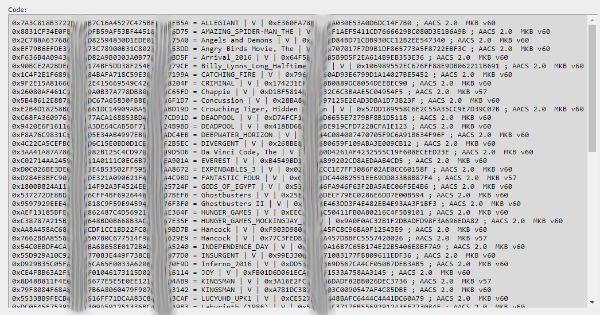 It’s well known that the US Government is actively involved in copyright enforcement efforts around the globe.
It’s well known that the US Government is actively involved in copyright enforcement efforts around the globe.
In some countries they’ve actively helped write copyright law. Elsewhere, U.S. authorities provide concrete suggestions for improvement, including in Sweden.
After The Pirate Bay was raided for the first time, more than ten years ago, the media highlighted that the U.S. Government and Hollywood pulled strings behind the scenes. However, little was known about what this actually entailed.
Today we can provide more context, thanks to a Freedom of Information request that was sent to the U.S. Department of State. While the events happened a decade ago, they show how action against The Pirate Bay was discussed at the highest political level.
The trail starts with a cable sent from the US Embassy in Sweden to Washington in November 2005. This is roughly six months before the Pirate Bay raid, which eventually resulted in criminal convictions for four men connected to the site.
The Embassy writes that Hollywood’s MPAA and the local Anti-Piracy Bureau (APB) met with US Ambassador Bivins and, separately, with Swedish State Secretary of Justice at the time, Dan Eliasson. The Pirate Bay issue was at the top of the agenda during these meetings.
“The MPA is particularly concerned about PirateBay, the world‘s largest Torrent file-sharing tracker. According to the MPA and based on Embassy’s follow-up discussions, the Justice Ministry is very interested in a constructive dialogue with the US. on these concerns,” the cable reads.
“Embassy understands that State and Commerce officials have also met with Swedish officials in Washington on the same concern,” it adds, with the Embassy requesting further “guidance” from Washington.
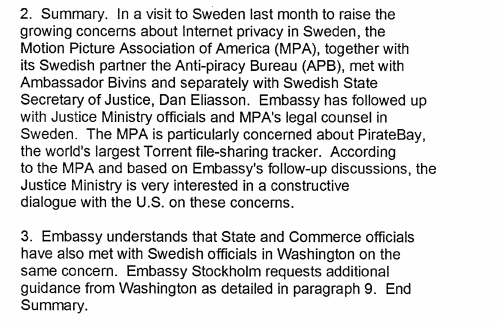
The document adds that there has been some movement on the piracy enforcement front in Sweden, with two legal cases pending. However, those were not the targets Hollywood was looking for.
“We have yet to see a ‘big fish’ tried – something the MPA badly wants to see, particularly in light of the fact that Sweden hosts the largest Bit Torrent file-sharing tracker in the world, ‘Pirate-Bay’, which openly flaunts IPR,” the cable writer comments.
Interestingly, Hollywood and the authorities were aware of the fact that a case against The Pirate Bay wouldn’t be an easy one. The site never stored any infringing material directly and had proper legal backing, the cable points out.
“However, it is not clear to us what constraints Sweden and even U.S. authorities would be under in pursuing a case like this when the site is legally well advised and studiously avoids storing any copyrighted material.”
At the time there were some rumors that Sweden would be placed on the US Trade Representative’s 301 Watch List. This could possibly result in negative trade implications. However, in a cable written April 2006, the US Embassy in Sweden was informed that, while there were concerns, it would not be listed. Not yet at least.
“We understand that a specialized organization for enforcement against Internet piracy currently is under consideration,” the cable reads, while mentioning The Pirate Bay once again.
“We are encouraged by reports of ongoing efforts related to Internet piracy in Sweden; however, the increase in Pirate Bay peers, up 74 percent in just the last 7 months, demonstrates the urgent need to step up current efforts dramatically to address this issue in the near term.”
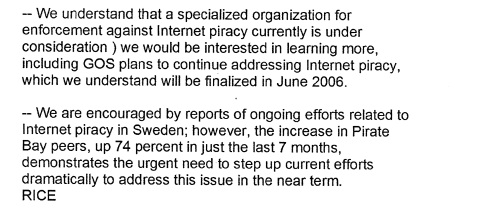
Then the ‘inevitable’ happened. On May 31, 2006, The Pirate Bay was raided by 65 Swedish police officers. They entered a datacenter in Stockholm with instructions to shut down the Pirate Bay’s servers and collect vital evidence.
A few weeks after the raid, the Embassy sent another cable to Washington informing the homefront on the apparent success of their efforts.
“Starting with the Motion Picture Association of America (MPAA) visit to post last fall, Embassy Stockholm has engaged intensely with our Swedish interlocutors in efforts to improve IPR enforcement, in particular with regard to Internet piracy. The actions on May 31 thus mark a significant victory for our IPR efforts.”
The US clearly saw a link between their diplomatic maneuvering and the Pirate Bay raid. This link was also brought up in the media at the time, with news reports citing sources claiming that Justice Minister Bodström and his State Secretary Dan Eliasson ordered the police raid under US pressure.
Interestingly, both Bodström and Eliasson denied any direct involvement of the Justice Ministry with the work of the police and prosecutors in the Pirate Bay case.
While the cables make it very clear that the US wanted The Pirate Bay gone, the Embassy said that the raid went beyond their expectations, suggesting they were not directly involved. The pressure was clearly there though.
In future cables, the Pirate Bay case was often mentioned, with regular updates on the media backlash and progress in the criminal investigation. According to the US Embassy in Sweden, shutting down The Pirate Bay “should not be underestimated as a sign of [Sweden’s] willingness to take action and their position against illegal piracy.”
The cables also make clear that in Washington, the Pirate Bay raid was celebrated as a victory that was directly triggered by US diplomacy.
In a cable sent in April 2007, the Embassy nominated one of its employees, whose name is redacted, for the State Department’s Foreign Service National (FSN) of the year award. Again, The Pirate Bay case was brought up.
“REDACTED has spearheaded-work on Internet piracy enforcement in Sweden. The issue is particularly acute here as Sweden was home to the largest Internet piracy site (Pirate Bay) in the world. The work has involved extensive contacts with the Ministry of Justice, the Motion Picture Agency, as well as the Anti-Piracy Bureau.”
The employee is praised for her diplomatic efforts behind the scenes which directly led to the decision to raid The Pirate Bay, the Embassy writes.
“REDACTED skillful outreach directly led to a bold decision by Swedish law enforcement authorities to raid Pirate Bay and shut it down. This was recognized as a major achievement in Washington in furthering U.S. efforts to combat Internet piracy worldwide.”
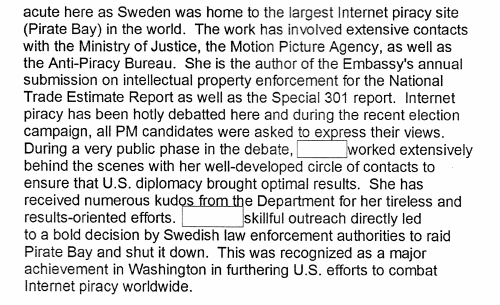
Despite US officials taking credit for the Pirate Bay raid, it didn’t turn out to be the success they had hoped for. The notorious torrent site was back online after three days, “flaunting IPR” bolder and braver than ever before.
The press coverage was largely unfavorable towards the US Government and Hollywood, while the people behind the site were seen as heroes by many.
The US Embassy in Sweden was well aware of the delicate situation but kept pushing for stronger copyright measures behind the scenes. This time even further in the background than before.
“The Pirate Bay raid was portrayed as caving to USG pressure. The delicate situation made it difficult, if not counter-productive, for the Embassy to play a public role on IPR issues. Behind the scenes, the Embassy has worked well with all stakeholders,” Washington was informed February 2008.
At the time, Sweden was being considered for the 301 Watch List once again. The Embassy pointed out that, given the public suspicion, this could backfire. The other option was to keep a potential watch list entry as a “looming threat” while Sweden implements the changes they’re looking for.
“The USG [US Govt] has to carefully determine which course of action will be the most productive; (1) a Watch-Listing with potentially negative repercussions in future GOS [Swedish Govt.] cooperation and in the public eye; or (2) continuing to exercise influence behind the scenes, with a potential Watch-Listing looming in the background as a continued threat.”
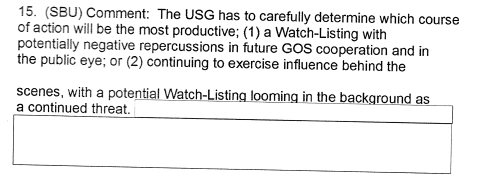
As our earlier coverage has shown, Sweden then went on to implement a list of copyright changes which also happened to be proposed by US copyright holders. Needless to say, Sweden was never placed on the US Trade Representative’s 301 Watch List.
TorrentFreak spoke with Peter Sunde, one of the Pirate Bay co-founders who was indicted after the raid, and who has since served a jail sentence for his involvement with the site.
He is happy to see the new information being released. This is yet more confirmation of what he and many others have known for quite some time.
While former Swedish State Secretary of Justice Dan Eliasson, who now happens to be the national police commissioner, denied any direct orders from the Justice Ministry, it’s clear that US pressure made an impact.
“It’s been an open secret that the USG was behind the unlawful raid against The Pirate Bay, and exerting their power with threats against Sweden like this. It’s nice to see these documents coming up, interestingly enough from the most secretive of governments,” he says.
There is still a lot of information missing though. The documents mention a fifth person that was supposed to be indicted, for example, which is completely new information. Sunde hopes that Sweden will open up its secret archives as well.
“I’m hoping that Sweden will now follow up and release the 747 documents they’ve classified as secret regarding this affair. The Minister of Justice at the time, Thomas Bodström, said that he would put all the cards on the table so the public would know what happened, but then classified these 747 documents as secret.
“Sweden has a proud history of transparency, celebrating 250 years of freedom of the press this year, and it’s an open sore that these documents are being held as classified,” Sunde adds.
—
The relevant responses to the Freedom of Information request, which was submitted by Rachael Tackett and shared with TorrentFreak, are available here.
Source: TF, for the latest info on copyright, file-sharing, torrent sites and more. We also have VPN discounts, offers and coupons

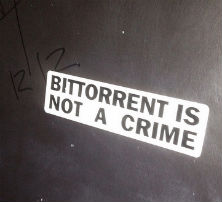 In recent years we’ve written several articles on Apple’s aversion to BitTorrent-related apps in the iOS store.
In recent years we’ve written several articles on Apple’s aversion to BitTorrent-related apps in the iOS store. 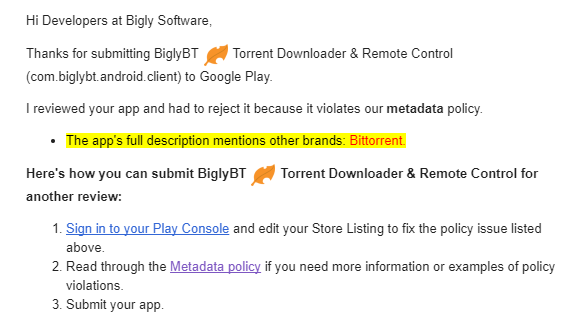
 For anyone familiar with the BitTorrent brand, there can only be one company that springs to mind. BitTorrent Inc., the outfit behind uTorrent that still employs BitTorrent creator Bram Cohen, seems the logical choice, but not everything is straightforward.
For anyone familiar with the BitTorrent brand, there can only be one company that springs to mind. BitTorrent Inc., the outfit behind uTorrent that still employs BitTorrent creator Bram Cohen, seems the logical choice, but not everything is straightforward.  It’s well known that the US Government is actively involved in copyright enforcement efforts around the globe.
It’s well known that the US Government is actively involved in copyright enforcement efforts around the globe. 




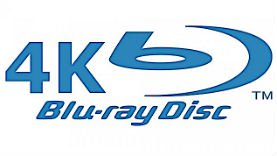 Nowadays, movie buffs and videophiles find it hard to imagine a good viewing experience without UHD content, but disc rippers and pirates have remained on the sidelines for a long time.
Nowadays, movie buffs and videophiles find it hard to imagine a good viewing experience without UHD content, but disc rippers and pirates have remained on the sidelines for a long time.